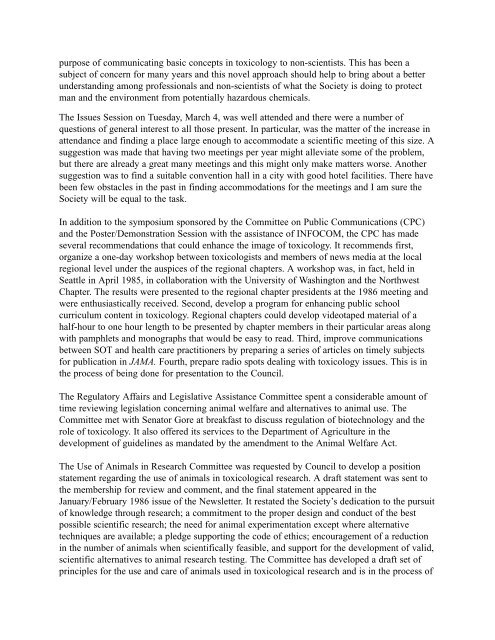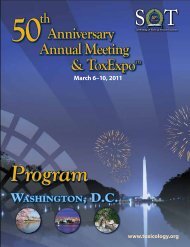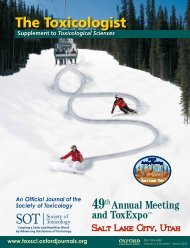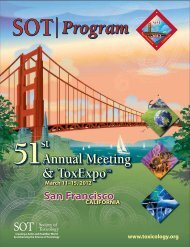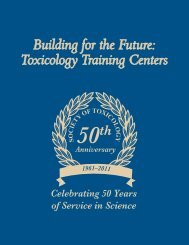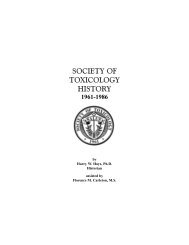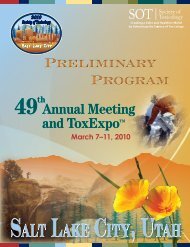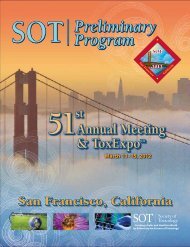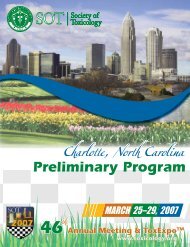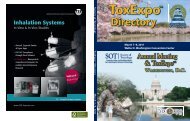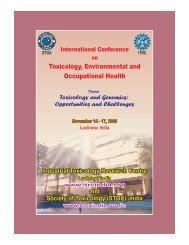SOCIETY O. TOXICOLOGY HISTORY - Society of Toxicology
SOCIETY O. TOXICOLOGY HISTORY - Society of Toxicology
SOCIETY O. TOXICOLOGY HISTORY - Society of Toxicology
Create successful ePaper yourself
Turn your PDF publications into a flip-book with our unique Google optimized e-Paper software.
purpose <strong>of</strong> communicating basic concepts in toxicology to non-scientists. This has been a<br />
subject <strong>of</strong> concern for many years and this novel approach should help to bring about a better<br />
understanding among pr<strong>of</strong>essionals and non-scientists <strong>of</strong> what the <strong>Society</strong> is doing to protect<br />
man and the environment from potentially hazardous chemicals.<br />
The Issues Session on Tuesday, March 4, was well attended and there were a number <strong>of</strong><br />
questions <strong>of</strong> general interest to all those present. In particular, was the matter <strong>of</strong> the increase in<br />
attendance and finding a place large enough to accommodate a scientific meeting <strong>of</strong> this size. A<br />
suggestion was made that having two meetings per year might alleviate some <strong>of</strong> the problem,<br />
but there are already a great many meetings and this might only make matters worse. Another<br />
suggestion was to find a suitable convention hall in a city with good hotel facilities. There have<br />
been few obstacles in the past in finding accommodations for the meetings and I am sure the<br />
<strong>Society</strong> will be equal to the task.<br />
In addition to the symposium sponsored by the Committee on Public Communications (CPC)<br />
and the Poster/Demonstration Session with the assistance <strong>of</strong> INFOCOM, the CPC has made<br />
several recommendations that could enhance the image <strong>of</strong> toxicology. It recommends first,<br />
organize a one-day workshop between toxicologists and members <strong>of</strong> news media at the local<br />
regional level under the auspices <strong>of</strong> the regional chapters. A workshop was, in fact, held in<br />
Seattle in April 1985, in collaboration with the University <strong>of</strong> Washington and the Northwest<br />
Chapter. The results were presented to the regional chapter presidents at the 1986 meeting and<br />
were enthusiastically received. Second, develop a program for enhancing public school<br />
curriculum content in toxicology. Regional chapters could develop videotaped material <strong>of</strong> a<br />
half-hour to one hour length to be presented by chapter members in their particular areas along<br />
with pamphlets and monographs that would be easy to read. Third, improve communications<br />
between SOT and health care practitioners by preparing a series <strong>of</strong> articles on timely subjects<br />
for publication in JAMA. Fourth, prepare radio spots dealing with toxicology issues. This is in<br />
the process <strong>of</strong> being done for presentation to the Council.<br />
The Regulatory Affairs and Legislative Assistance Committee spent a considerable amount <strong>of</strong><br />
time reviewing legislation concerning animal welfare and alternatives to animal use. The<br />
Committee met with Senator Gore at breakfast to discuss regulation <strong>of</strong> biotechnology and the<br />
role <strong>of</strong> toxicology. It also <strong>of</strong>fered its services to the Department <strong>of</strong> Agriculture in the<br />
development <strong>of</strong> guidelines as mandated by the amendment to the Animal Welfare Act.<br />
The Use <strong>of</strong> Animals in Research Committee was requested by Council to develop a position<br />
statement regarding the use <strong>of</strong> animals in toxicological research. A draft statement was sent to<br />
the membership for review and comment, and the final statement appeared in the<br />
January/February 1986 issue <strong>of</strong> the Newsletter. It restated the <strong>Society</strong>’s dedication to the pursuit<br />
<strong>of</strong> knowledge through research; a commitment to the proper design and conduct <strong>of</strong> the best<br />
possible scientific research; the need for animal experimentation except where alternative<br />
techniques are available; a pledge supporting the code <strong>of</strong> ethics; encouragement <strong>of</strong> a reduction<br />
in the number <strong>of</strong> animals when scientifically feasible, and support for the development <strong>of</strong> valid,<br />
scientific alternatives to animal research testing. The Committee has developed a draft set <strong>of</strong><br />
principles for the use and care <strong>of</strong> animals used in toxicological research and is in the process <strong>of</strong>


